Global Financial Integrity (GFI) and over 100 other members of the Financial Accountability and Corporate Transparency (FACT) Coalition have submitted a letter to the U.S. Department of the Treasury (Treasury) and to the Internal Revenue Service (IRS) urging them to maintain and strengthen a proposed rule on Country-by-Country Reporting that would bring much needed transparency to how U.S.-based companies book profits and pay taxes in many of the countries in which they have subsidiaries. The proposed rule is meant to give the IRS and, potentially, foreign tax authorities, a window into how multinational companies may be gaming the international tax system and avoiding taxation in the U.S. and other countries. Today is the final day to submit public comments to Treasury and the IRS on the proposed rulemaking.
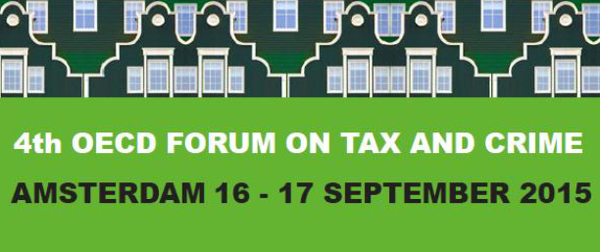
Can we curtail global crime while we welcome tax evasion? In my opinion the answer to this question is a resounding “NO.” But this is what we are trying to do.
Let us be very honest with ourselves. We in the West have over the past 4 or 5 decades built a global shadow financial system designed to move tax evading and tax avoiding money across borders. I think by now all of us are familiar with its elements – tax havens, secrecy jurisdictions, disguised corporations, anonymous trust accounts, fake foundations, money laundering techniques, trade misinvoicing is the most commonly used component of this structure, and then there are holes left in the laws of our western countries that facilitate the movement of money through this shadow financial system and ultimately into our own economies.
By Koen Roovers, Global Financial Integrity, February 18, 2015
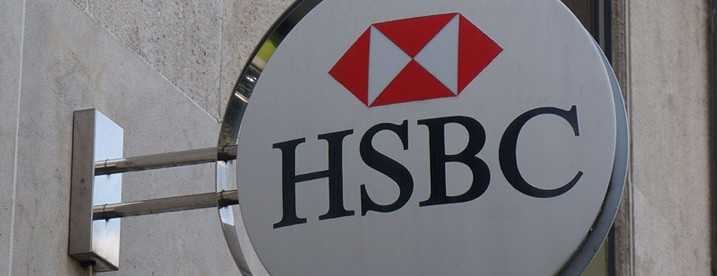
The SwissLeaks Scandal around the HSBC Bank Subsidiary There Has Highlighted How Globalization Can Facilitate Tax-Dodgers. Only a Bright Spotlight of Information Can Deter Them.
A major leak of incriminating HSBC records last week resulted in print and television news coverage around the globe, trended on Twitter for several days and prompted several governments to start long-anticipated investigations. Through its Swiss entity, the British banking juggernaut helped customers from around the world to hide their money for tax evasion or other nefarious purposes without any questions asked. In fact, in several of the ‘scripts’ which accompany the accounts, banking personnel are seen to be very willing to accommodate dubious requests—from allowing cash withdrawals worth millions of dollars to setting up sham legal entities to obscure the ownership of the funds.
The ‘Lagarde list’, as the files have come to be known, has been around for a couple of years and so many have been asking: ‘Why do we only see government action once a group of reporters put the spotlight on this?’ Another frequent question has been whether the bank has really (as it claims) cleaned up its act.
Relatively few commentators have asked: how do we prevent this in the first place?
By Tom Cardamone, December 24, 2014
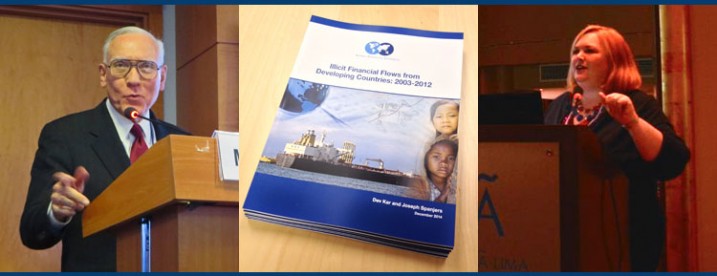
A Quarterly Newsletter on the Work of Global Financial Integrity from October through December 2014
Global Financial Integrity is pleased to present GFI Engages, a quarterly newsletter created to highlight events at GFI and in the world of illicit financial flows. We look forward to keeping you updated on our research, advocacy, high level engagement, and media presence. The following items represent just a fraction of what GFI has been up to since September, so make sure to check our new website for frequent updates.
World Bank Forum on Illicit Financial Flows
On October 11, GFI President Raymond Baker was a featured member of a World Bank panel, titled “Illicit Financial Flows and the Post-2015 Development Agenda,” which focused on the need to curtail the negative effects of illicit financial flows on sustainable development.
Held during the IMF/World Bank Annual Meetings, the public forum was hosted by the World Bank Group’s Integrity Vice Presidency and included high-profile speakers from Bangladesh, Denmark, Norway, and the Untied States.
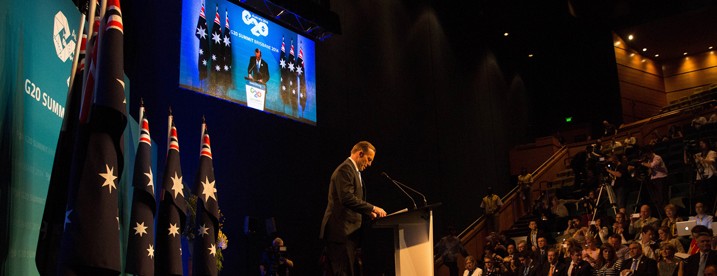
World Leaders’ Weekend Summit Misses Opportunity to Act on Beneficial Ownership or Country-by-Country Reporting
Work Remains to Ensure Developing Countries Benefit Fully From Global Automatic Exchange of Financial Information, but Agreement to Include Developing Countries in OECD BEPS Project an Encouraging Move
WASHINGTON, DC – G20 leaders met this past weekend in Brisbane, Australia for their annual summit, issuing a communiqué full of ambitious proposals for growing the global economy, but noticeably lacking in responses to illicit financial flows, one of the largest drags on development worldwide. Global Financial Integrity (GFI), a Washington, DC-based research and advocacy organization, expressed its disappointment at the underwhelming result.
By Heather Lowe, October 30, 2014
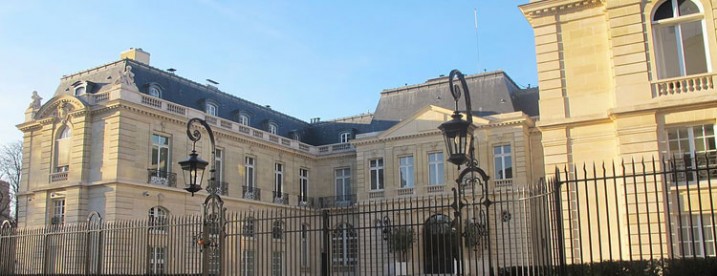
Everyone Should Be Able to Determine with Whom They Are Doing Business, Writes GFI’s Heather Lowe
On Monday of this week, the Financial Action Task Force (FATF), the body setting international anti-money laundering standards, published new Guidance on Transparency and Beneficial Ownership, detailing a variety of ways in which countries can comply with FATF Recommendations 24 and 25 (which relate to transparency and beneficial ownership of legal persons and arrangements) and sending the message that complaining about the difficulty of compliance is no longer an option. FATF consulted with the Organization for Economic Cooperation and Development (OECD) on this publication, recognizing that identification of the beneficial owners of legal entities and arrangements is not only a money laundering issue, but a fundamental element of the OECD’s new multilateral automatic exchange of financial information. What neither FATF nor the OECD appears to have yet grasped, however, is that beneficial ownership – knowing who is ultimately behind a company – is a matter of sound business practice. Everyone should be able to determine with whom they are doing business.
That lack of understanding was evident on page 21 of the Guidance, where FATF made it clear that it was supportive of countries choosing to create publicly accessible registries for information, as the UK is in the process of creating. FATF stated that:
“although this is not required by the FATF Recommendations, some countries may be able to provide public access to information through a searchable online database.”
The rationale behind this, they say, is that it:
“would increase transparency by allowing greater scrutiny of information by, for example, the civil society, and timely access to information by financial institutions, DNFBPs and overseas authorities.”
While we civil society folks appreciate what appears to be an attempt by FATF to demonstrate that they have heard civil society’s drumbeat on this issue, unfortunately what this shows is that they have not yet understood the variety of reasons for that drumbeat.
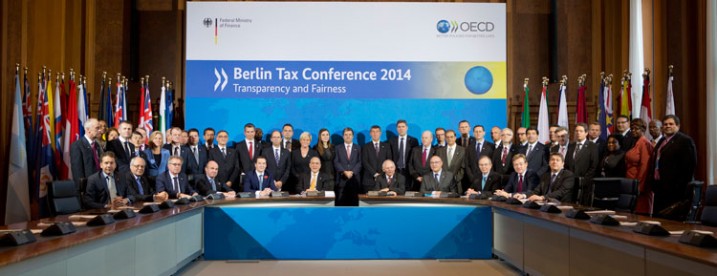
89 Jurisdictions Commit to Exchange Financial Information Automatically by 2018 but Significant Work Remains
Framework Misses Broader Concept of Illicit Flows
WASHINGTON, DC – While noting significant progress today in the global effort to curb tax evasion, Global Financial Integrity (GFI) expressed concerns that the OECD/G20 movement toward automatic exchange of financial information was excluding the world’s poorest countries from reaping any benefits while failing to deal with the issue of illicit financial flows in comprehensive manor.
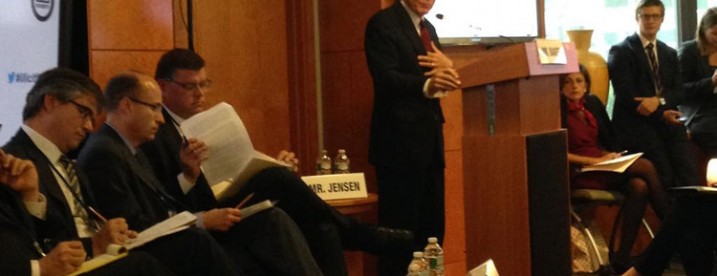
GFI President Raymond Baker participated in “Illicit Financial Flows on the Post-2015 Development Agenda,” a panel discussion organized by the World Bank ‘s Integrity Vice Presidency on October 11, 2014 during the 2014 IMF/World Bank Annual Meetings. The forum addressed the issue of illicit financial flows in the context of the Post-2015 Sustainable Development Agenda.
Joining Mr. Baker on the panel were (in alphabetical order) Hans Brattskar, State Secretary, Ministry of Foreign Affairs, Norway; Mogens Jensen, Minister for Trade and Development Cooperation, Denmark; Marcel, Senior Director, World Bank Group; Leonard Mccarthy, Integrity Vice President, World Bank Group; Dr. Atiur Rahman, Governor, Central Bank of Bangladesh; and Nena Stoiljkovic, Global Practices Vice President, World Bank Group.







